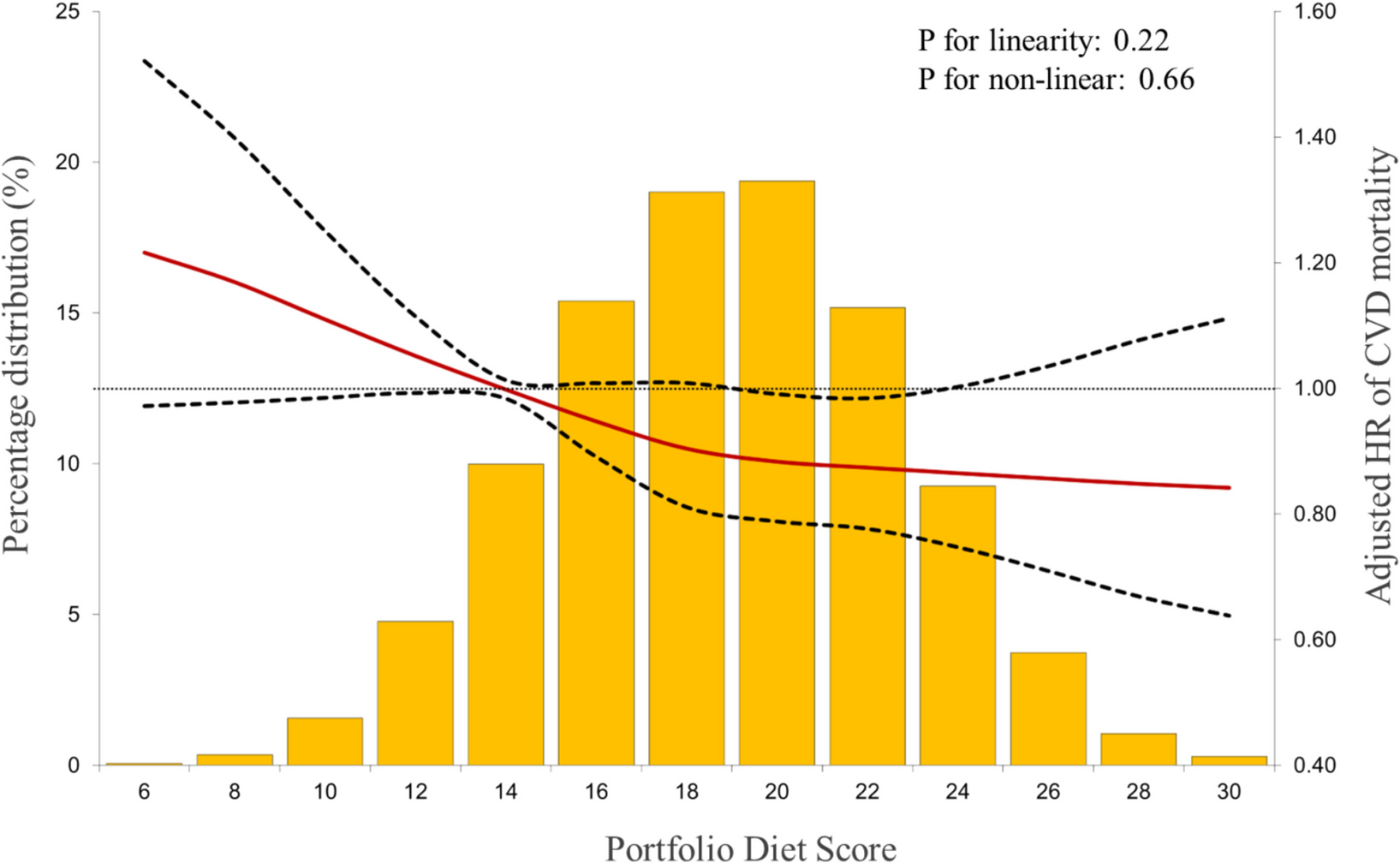2025-06-02 トロント大学(U of T)
トロント大学の研究チームは、植物性食品を中心とした「ポートフォリオ・ダイエット」が心血管疾患のリスクを低減することを明らかにしました。この食事法は、ナッツ、豆腐や大豆製品、粘性のある食物繊維(オートミールやリンゴなど)、植物ステロール、オリーブオイルなどの一価不飽和脂肪酸を豊富に含む食品を組み合わせることで、LDLコレステロール(悪玉コレステロール)を効果的に下げることができます。
研究では、ポートフォリオ・ダイエットの遵守度が高い人々は、心血管疾患のリスクが16%、冠動脈性心疾患のリスクが18%、全死亡率が14%低下することが示されました。さらに、若年成人においてもこの食事法を50%遵守することで、心疾患リスクの上昇を約6年遅らせ、完全に遵守すれば最大13年遅らせる可能性があるとされています。これらの効果は、血中脂質、炎症マーカー、血糖値の改善によるものと考えられています。
ポートフォリオ・ダイエットは、地中海食やDASH食と並ぶ心臓に優しい食事法として注目されており、特に若年層における早期の食習慣改善が、将来的な心血管疾患の予防に寄与すると期待されています。
<関連情報>
- https://www.utoronto.ca/news/double-serving-evidence-underscores-power-plant-based-portfolio-diet-heart-health
- https://bmcmedicine.biomedcentral.com/articles/10.1186/s12916-025-04067-1
- https://bmcpublichealth.biomedcentral.com/articles/10.1186/s12889-025-22479-9
米国成人における1988~2019年のポートフォリオ食パターンと心血管疾患死亡リスク:前向きコホート研究 The portfolio dietary pattern and risk of cardiovascular disease mortality during 1988–2019 in US adults: a prospective cohort study
Meaghan E. Kavanagh,Andreea Zurbau,Andrea J. Glenn,Julianah O. Oguntala,Robert G. Josse,Vasanti S. Malik,Laura Chiavaroli,Simin Liu,Cyril W. C. Kendall,David J. A. Jenkins &J ohn L. Sievenpiper
BMC Medicine Published:21 May 2025
DOI:https://doi.org/10.1186/s12916-025-04067-1

Background
The Portfolio Diet, a dietary pattern of cholesterol-lowering foods, has been shown to reduce cardiovascular disease (CVD) risk factors in clinical trials and lower CVD risk in observational cohorts of mainly white men and women. However, evidence on mortality outcomes in diverse populations is limited.
Objective
To examine the association of the Portfolio dietary pattern with CVD mortality in a racially diverse cohort.
Methods
A total of 14,835 US adults from the National Health and Nutrition Examination Survey, NHANES (1988–1994), were included. Diet was assessed by a 24-h dietary recall which was supplemented with a food frequency questionnaire at baseline using the Portfolio Diet Score (PDS), with positive points for nuts, plant protein, viscous fiber, phytosterols, and plant monounsaturated fatty acid sources, and negative points for foods high in saturated fat and cholesterol (range, 6–30 points). The primary outcome was CVD mortality. Other mortality outcomes included coronary heart disease (CHD), stroke, and all-cause mortality.
Results
During 22 years of follow-up, 2300 CVD deaths, including 1887 CHD deaths, 413 stroke deaths, and 6238 all-cause deaths were documented. Greater adherence was inversely associated with risk factors including blood lipids, glycemia, and inflammation. Treated as a continuous variable, an increase in PDS by 8 points was associated with a 12% (hazard ratio 0.88 [95% confidence intervals:0.78, 0.99]), 14% (0.86 [0.78, 0.96]), and 12% (0.88 [0.82, 0.95]) lower risk of CVD, CHD, and all-cause mortality after adjustments for known CVD risk factors. Comparing the highest to lowest tertiles of the PDS, higher PDS was associated with 16% (0.84 [0.73, 0.98]), 18% (0.82 [0.72, 0.95]) and 14% (0.86 [0.78, 0.96]) lower risk of CVD, CHD, and all-cause mortality, respectively. As part of exploratory analyses, an interaction between PDS and race/ethnicity was observed, emphasizing the necessity of future research involving underserved groups.
Conclusions
Among a national cohort of racially diverse adults in the US, greater adherence to the Portfolio dietary pattern was inversely and prospectively associated with CVD, CHD, and all-cause mortality.
若い多民族コホートにおけるポートフォリオダイエットとLDL-C:累積暴露モデリングによる横断分析 Portfolio diet and LDL-C in a young, multiethnic cohort: cross-sectional analyses with cumulative exposure modeling
Victoria Chen,Laura Chiavaroli,Andrea J. Glenn,Meaghan E. Kavanagh,Tara Zeitoun,Sara Mahdavi,Cyril W. C. Kendall,David J. A. Jenkins,Ahmed El-Sohemy & John L. Sievenpiper
BMC Public Health Published:13 May 2025
DOI:https://doi.org/10.1186/s12889-025-22479-9
Abstract
Background
The Portfolio Diet is a plant-based dietary pattern of cholesterol-lowering foods that has demonstrated clinically meaningful reductions in low-density lipoprotein cholesterol (LDL-C) and other cardiovascular risk factors. However, the Portfolio Diet has not been assessed in an ethnoculturally diverse population of young adults.
Objective
To examine the association of the Portfolio Diet Score (PDS) with LDL-C and other established cardiovascular risk factors in a young adult population.
Methods
This cross-sectional analysis included 1,507 men and women (mean age, 23 ± 3 years) of diverse ethnocultural backgrounds from the Toronto Nutrigenomics and Health Study. Diet was assessed by a validated Toronto-modified Harvard 196-item food frequency questionnaire with adherence to the Portfolio Diet measured using the Portfolio Diet Score. Data were analyzed using multiple linear regressions with adjustment for potential confounders. Modeling analyses related LDL-C levels according to absolute adherence to the Portfolio Diet with cumulative LDL-C and onset of rising cardiovascular risk by age.
Results
Participants were Caucasian (49%), East Asian (34%), South Asian (11%), or other (7%) with a mean LDL-C of 2.3 ± 0.7mmol/L. A 1-point higher PDS and higher PDS tertiles were associated with lower LDL-C (ß [95% CI] per 1-point: -0.009mmol/L [-0.016, -0.002], P = 0.013; Ptrend across tertiles =0.040), non-HDL-C (-0.010mmol/L [-0.018, -0.002], P = 0.014; Ptrend=0.028), total cholesterol (-0.011mmol/L [-0.019, -0.003], P = 0.011; Ptrend=0.038), systolic blood pressure (-0.150mmHg [-0.250, -0.050], P = 0.003; Ptrend<0.001) and diastolic blood pressure (-0.133mmHg [-0.219, -0.046], P = 0.003; Ptrend<0.001). Higher PDS tertiles were associated with lower triglycerides (Ptrend=0.039). A 1-point higher PDS was also associated with lower BMI (-0.038 kg/m2 [-0.071, -0.004], P = 0.026), waist circumference (-0.092cm [-0.171, -0.013], P = 0.022), body weight (-0.124 kg [-0.229, -0.019], P = 0.021) and FMI (-0.019 kg/m2 [-0.037, -0.001], P =0.039). There was no association with HDL-C, CRP, or fasting glucose. Modeling analyses suggest that compared to low adherence, 50% and 100% adherence to the Portfolio Diet may delay the onset of rising cardiovascular risk by an estimated 6 and 13 years, respectively.
Conclusions
Among young adults, the PDS was inversely associated with LDL-C and several other established cardiovascular risk factors. Early adherence to the Portfolio Diet may limit lifetime exposure to LDL-C and could delay the age at which cardiovascular events begin.


